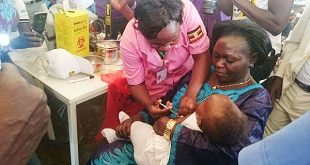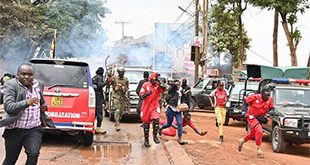
Kampala, Uganda | THE INDEPENDENT | The United Nations agencies in Uganda will only give priority to local products when purchasing for humanitarian aid, if the price is competitive enough.
The office of the UN food aid agency in Uganda says most of the aid comes with conditions on what to purchase, but also some comes in kind and not in cash.
This comes as the UN is sending out warnings that the contributions to emergency and relief aid towards refugees is dwindling, forcing them to cut the rations to as low as 60 percent of the quota.
But several countries continue to give donations to refugees in Uganda and other countries, in kind and in cash and this week, the governments of Germany and Sweden contributed Ushs20 billion towards the humanitarian aid from refugees in Uganda.
In April, Uganda’s Minister for Relief, Disaster Preparedness and Refugees, Hilary Onek took a swipe at the UN World Food Program for continuously purchasing food items from other countries to feed refugees in Uganda. “We are going to discuss this matter in Cabinet and we are not going to allow procurement of food outside the country by the WFP, let the money remain here,” Onek told the media at the Uganda Media Centre in Kampala.
Onek was responding to statement by the UN Resident Coordinator, Rosa Malango, that the UN continues to purchase food from foreign markets because of the poor quality of the Ugandan products.
But Eng. Onek, himself a commercial farmer in northern Uganda reminded the UN Boss that even the UN expatriates in Uganda were eating local food and were health, adding that is the refugees cannot eat Ugandan-produced food, they could as well be shifted to another country.
Now the UN food aid agency, which is feeding 1.2 million refugees in Uganda, says about 47 percent of refugees they support receive assistance in-kind and 53 percent in cash.
WFP Uganda Country Director El-Khidir Daloum says also, that donors provide them with support in-kind in form of maize and in-cash, and the cash is dedicated to the purchase of either maize or beans, or for cash remittance.
“When the support is in cash and dedicated to purchase of maize or beans, WFP assesses availability and price, and bases on this to buy locally or regionally” says Daloum.
On the claims that Ugandan maize is ban and therefore doesn’t pass the UN purchase standards, the WFP boss could not say when they will start buying local, but said they are supporting g efforts to improve the quality of the local produce.
“In addition, WFP is working with local partners to improve the quality of produce from farmers in Uganda using simple and affordable techniques that also preserve the environment. We are dedicated to working with government to create a sustainable food system where everyone has access to quality nutritious food,” he said in a statement mailed to URN.
The Uganda National Bureau of Standards, UNBS, maintains that Uganda’s maize product still has standards issues, though there are some products that meet national, regional and international standards.
As of June this year, 41 companies had been certified by the UNBS to supply maize products onto the market, with UNBS saying that the country has development standards that are in harmony with the regional and international standards. “This means that out people can export quality maize to the regional and international markets,” says David Livingstone Ebiru, the Executive Director, UNBS.
Earlier, Ebiru said the government was encouraging the farmers and traders to increase processing or value addition to their maize grain to prevent Kenyan traders from buying raw grain from farmers, which affects the quality of the product along the value chain.
*****
URN
 The Independent Uganda: You get the Truth we Pay the Price
The Independent Uganda: You get the Truth we Pay the Price


